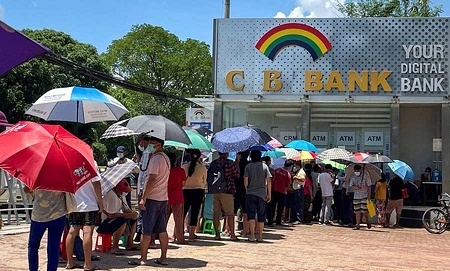
Myanmar's crumbling economy runs low on cash

If you need cash in Myanmar, you have to get up early. Queues start forming outside banks at 4 am, where the first 15 or 30 customers are given a plastic token that will allow them to enter the bank when it opens at 9:30 am and withdraw cash, according to more than a dozen people who spoke to Reuters.
If you do not get a token, you either have to queue for hours for the few functioning cash dispensing machines outside or go to black-market brokers who charge big commissions.
The cash crisis is one of the most pressing problems for the people of Myanmar after the Feb 1 military coup. The central bank, now run by a junta appointee, has not returned some of the reserves it holds for private banks, without giving any reason, leaving the banks short of cash.
The banks themselves have been closed or open only intermittently as many staff have gone on strike to protest against the coup. Meanwhile, internet outages make online transactions difficult and international transfers have largely stopped working.
That presents problems for Burmese people and small businesses as they try to navigate an economy rapidly crumbling under the country’s new leaders and the collapse of tourism, one of Myanmar’s fastest-growing sectors. The Burmese kyat has dropped some 20 per cent in value since the coup.
“It’s now very difficult to operate a business,” said Hnin Hnin, an entrepreneur in her mid-20s who supplies shampoo and bedsheets to high-end hotels. “Traders don’t accept bank transfers now. They want cash. So we need to find the cash.”
As a result, Hnin Hnin, who agreed to be identified only by a part of her name to discuss sensitive matters, has been one of the thousands of people queuing daily in front of the few functioning cash machines in major cities. Some people band together in groups of five, she said, so one person can take out money for the whole group.
She has also been forced to figure out ways to pay her suppliers overseas, by making an agreement to swap money with a partner holding cash in an account in Thailand. Under the agreement, the partner gives Hnin Hnin access to her Thai baht account, so she can pay suppliers in Thailand, and Hnin Hnin pays her back with physical kyat notes in Myanmar.
The central bank and the junta did not respond to requests for comment. Reuters put questions to Myanmar’s four largest private banks, including Kanbawza Bank and CB Bank. They also declined to respond.
It is now almost impossible to get hold of US dollars or other overseas currency at regular exchange centres in Yangon, a dozen people told Reuters. Black-market traders will take online transfers in exchange for physical notes in various currencies, they said, but add a commission of up to 10 per cent.
Myanmar's private banks were in trouble long before this year’s coup, at least partly because of their habit of lending money to well-connected customers who rarely bothered to pay them back, at least four bankers, including then-deputy central bank governor, told Reuters in 2017.
The coup and the protests against it now mean there is no functional banking system, according to Richard Horsey, an independent political analyst specialising in Myanmar.
“You have a three-pronged hit to the banking system,” said Horsey. “The pre-existing problems with the banks, which will be all the more difficult to resolve now; you have the economic impact of the coup which has produced a virtual hard stop to the economy without any kind of ability by the regime to manage that or inject stimulus; and then you have the banking sector strike itself.”
People want to withdraw cash now to buy food and other essentials, said Horsey, and also because they fear the banking system will collapse.
POVERTY RATE COULD DOUBLE
The cash crisis is the most immediate sign of much deeper economic problems facing Myanmar, some experts said.
Financial research firm Fitch Solutions said in April it expected Myanmar's gross domestic product to shrink 20 per cent in 2021.
The United Nations Development Programme said last month that Myanmar faces economic collapse due to the combined effect of the new coronavirus and the coup, which in its worst-case analysis could put nearly half the country’s 54 million people into poverty, compared to about a quarter in 2017.
“If the situation on the ground persists, the poverty rate could double by the beginning of 2022,” said UNDP in its report. "By then, the shock from the crisis will have resulted in significant losses of wages and income, particularly from small businesses, and a drop in access to food, basic services and social protection."
Editor & Publisher: S. M. Mesbah Uddin
Published by the Editor from House-45,
Road-3, Section-12, Pallabi, Mirpur
Dhaka-1216, Bangladesh
Call: +01713180024 & 0167 538 3357
News & Commercial Office :
Phone: 096 9612 7234 & 096 1175 5298
e-mail: financialpostbd@gmail.com
HAC & Marketing (Advertisement)
Call: 01616 521 297
e-mail: tdfpad@gmail.com